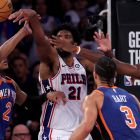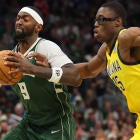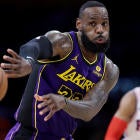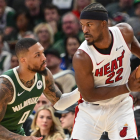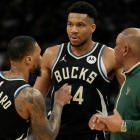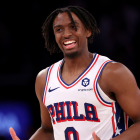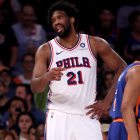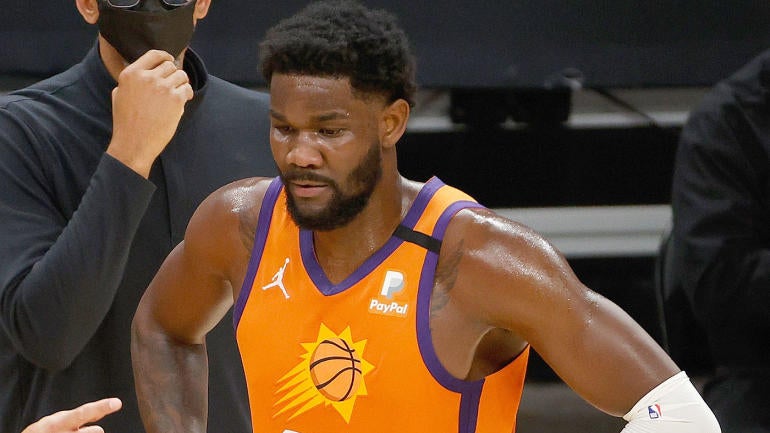
Remember when Minnesota Timberwolves owner Glen Taylor wanted to look Andrew Wiggins in the eye and hear him say that he was committed to improving before giving him a max contract in 2017? That's about as intense as negotiations get between No. 1 overall picks and their teams when it comes to rookie extensions. Eight of the past 10 No. 1 overall picks have received the max upon reaching extension eligibility. Markelle Fultz may have made it nine were it not for injuries, but his draft status still got him a $50 million deal from the Orlando Magic despite playing in only 105 NBA games in his first three seasons.
Teams tend not to treat such prospects rationally. Picking a player No. 1 overall sends a message about that player's stature within the organization. He is the future, the face of the franchise and a budding star whether or not he's earned such distinctions. He gets the max because giving him anything less creates the impression that the initial investment in that player might not have been worthwhile. The Timberwolves wanted Wiggins to be a franchise player, so they paid him to be a franchise player hoping that would make him one.

CBS Sports HQ Newsletter
Your Ultimate Guide to Every Day in Sports
We bring sports news that matters to your inbox, to help you stay informed and get a winning edge.
Thanks for signing up!
Keep an eye on your inbox.
Sorry!
There was an error processing your subscription.
In that sense, the Phoenix Suns actually deserve a bit of credit for how they handled extension negotiations with Deandre Ayton. The young big man wanted the max, but according to ESPN's Adrian Wojnarowski, Suns ownership wasn't ready to give it to him. Ayton publicly voiced his displeasure with the situation while negotiations were ongoing.
"I love Phoenix, but I'm really disappointed that we haven't really gotten a deal done yet," Ayton said last Tuesday. "I mean, we were two wins from a championship. I just really want to be respected, to be honest, to be respected like my peers are being respected by their teams. I'll just keep it like that.
Now negotiations have ended. Ayton and the Suns will not reach an agreement in time as Phoenix held firm to its belief that Ayton has not yet earned a max contract. Whether or not Ayton ultimately deserves that much is almost irrelevant. The Suns aren't letting his draft position create a false sense of obligation. If they do end up acquiescing to Ayton next offseason or beyond, it will be because they genuinely view him as a player deserving of the max based on current market conditions. This time around, they attempted to negotiate with him on merit, as they would any other player.
Ayton -- perhaps justifiably -- believes he has earned the max on merit. Whether or not this is true hardly matters. Relationships between teams and players frequently fracture over money. Contentious negotiations can seep into locker rooms and derail championship pursuits. The Suns aren't just haggling over dollars and cents here. They're risking a very rare and very precious opportunity to win the title they fell two games short of a season ago. Phoenix has already built a contending-caliber roster, but as it's learning firsthand, maintaining one is even harder. So let's dive into these negotiations and what they mean for the Suns, starting with how much Ayton is eligible for and how much he might actually be worth.
What could the Suns have paid Ayton?
There are three possible answers to this question, and we'll go through them from most expensive to least.
- Luka Doncic will earn roughly $207 million on his rookie extension. This represents a five-year deal starting at 30 percent of the expected 2022-23 salary cap, when that deal will kick in. Doncic is eligible to earn 30 percent of the cap rather than the standard 25 percent for a player with his experience because he qualified for the Derrick Rose Rule by making an All-NBA team. You've likely seen that $207 million figure attached to players like Trae Young and Shai Gilgeous-Alexander, but technically, neither is eligible for that yet. Their contracts include Rose Rule escalators. If they meet any of the criteria next season (All-NBA, MVP or Defensive Player of the Year), their deals will start at 30 percent of the cap. If not? They start at 25 percent. This is the full max that Ayton was trying to get: 25 percent with the possibility of jumping up to 30 percent with a good enough season.
- The 25 percent max Ayton will likely be eligible for will come in at around $172.5 million over five years. However, it should be noted that Ayton could not sign a five-year deal worth any less than that. Five-year rookie extensions must be worth the max. Anything less can last only four years.
- The 25 percent max on a four-year deal would pay Ayton $133.3 million. If Phoenix was unwilling to give Ayton a full max, they would have had to negotiate from this point downward.
At this moment, Phoenix's exact qualms are unknown. If this was as simple as hesitation on those Rose Rule escalators, a compromise might have come. Bam Adebayo, for instance, signed a deal that only would have gotten up to 30 percent of the cap had he won MVP or made All-NBA First Team. Defensive Player of the Year only would have pushed him up to 27.5 percent. There is usually wiggle room within that 25-30 percent band. But if Phoenix was unwilling to give Ayton even the standard 25 percent max on a five-year deal? That's where things start to get a bit more complicated. The gap between $207 million and $133 million is vast.
Is Deandre Ayton worth the max?
Only four true centers in the NBA are making the max: Rudy Gobert, Karl-Anthony Towns, Joel Embiid and Nikola Jokic. Include part-time centers like Anthony Davis and Bam Adebayo and the list remains very exclusive. These are MVPs, Defensive Players of the Year and NBA champions we're talking about here. Even Kristaps Porzingis has made an All-Star Game. In an NBA that increasingly devalues size, that appears to be the baseline for a big man max. Thus far, Ayton has not crossed that threshold.
The going rate for centers in that next tier down is substantially lower. Clint Capela and Myles Turner are both making less than $20 million this season, and they were meaningfully better regular-season players than Ayton last year. Capela finished sixth in Defensive Player of the Year voting and Turner finished ninth. Ayton didn't receive a single vote. Capela out-scored and out-rebounded Ayton in the regular season. Part of Ayton's long-term appeal lies in his upside as a shooter, but through three seasons, Ayton has attempted only 37 3-pointers. Turner made 69 last season alone. Jarrett Allen, an inferior player to Ayton and Capela, reinforced $20 million per year as roughly the market rate for their variety of rim-running and rim-protecting big men by getting $100 million over five years from the Cleveland Cavaliers.
Of course, Ayton has played only three seasons, and while his pre-draft pedigree alone shouldn't guarantee him a max contract, it does suggest more room for improvement than a typical 23-year-old would have. That upside was visible in the postseason, when Ayton grew into the sort of elite play-finisher and defensive anchor Capela was all season for the Hawks. If Phoenix believes he can maintain that form, he's immediately worth more than Capela just on the hope that he can grow into even a Turner-level shooter. But doing so wouldn't make him a max-level player based on the very limited group of bigs actually earning that much right now. Putting aside Porzingis, who was well on his way to superstardom before injuries derailed this portion of his career, that group encompasses players who are either elite shot-creators (Jokic and Towns), elite defenders (Gobert and Adebayo) or, in the rare cases of Davis and Embiid, players who are elite in both areas.
Ayton might one day enter either or both of those groups, and there might be teams willing to pay him on the hope that he does. For now, he's a tier below. Nearly 84 percent of his baskets were assisted during his stellar postseason run, and while he does generate a meaningful degree of gravity near the basket, he hasn't yet figured out how to leverage that gravity as a short-roll or low-post passer. The Western Conference finals presented an ideal opportunity for Ayton to prove that he could create his own offense against mismatches as the Clippers often played without centers. Yet he averaged only 12.5 shot attempts per game in that series, failing to bully a roster designed to let him score.
As much as he's improved defensively, Giannis Antetokounmpo still gave him fits in the Finals. There aren't many opponents with his combination of size, skill and agility, but they're the ones Phoenix will have to beat to win a title. The healthy Anthony Davis has consistently won his battles with Ayton, and we haven't yet seen how he'd fare in a playoff series against opponents like Stephen Curry or James Harden that excel at forcing bigs out onto the perimeter. Again, Ayton is 23. He's an absolute physical marvel and has rare dexterity even among modern big men. There is plenty of reason to project him as a max-caliber big man eventually. But based on what the market currently dictates, he's not quite there through three seasons.
And yet … Phoenix came two wins short of winning the championship three months ago. It outscored the Bucks with Ayton on the floor and got absolutely demolished when he went to the bench. Chris Paul isn't getting any younger. As we'll soon cover, the rest of this roster isn't getting any cheaper. The window to win a championship is open right now, and barring a surprising trade request from Devin Booker's college teammate and close friend Karl-Anthony Towns, there just isn't a better realistic option for them at center than Ayton, and the best version of Ayton is likely the satisfied, well-paid one
The dirty secret behind the max contract is that it's entirely contextual. There's ultimately no such thing as a "max player," only players with the leverage to command a max in a given moment. After all, Otto Porter Jr. just finished a max contract. Tobias Harris is currently playing on one, and Chandler Parsons got two of them. One could argue that Phoenix's title window creates leverage for Ayton. Even if he does wind up being overpaid, which is by no means a certainty, it won't matter if the end result is the Suns hoisting the Larry O'Brien Trophy. As the 2021 postseason proved, Ayton already carries a fair bit of championship equity. He's only going to gain more of it as he develops, and that's a rarity among big men. Modern offenses are designed to play them off of the court. Centers who can generate positive value on both ends of the floor against even the best opponents are increasingly rare.
Nikola Vucevic is playing out a deal that pays him $25 million annually. He's a better offensive player than Ayton ... but he's not in the Jokic-Towns tier of elite offensive centers. That makes his defensive shortcomings more troublesome. Is the modest offensive upgrade he provides over Ayton worthwhile when Ayton can probably hold his own defensively in most matchups and Vucevic can't? That depends on a variety of other roster and coaching factors, but the short answer is... probably no. While most teams looking to raise their floor from the basement into the playoffs would prefer Vucevic's offense, any team with genuine championship ambitions would choose Ayton's two-way upside to raise their ceiling. They might take Ayton over any non-max big man currently in basketball.
Whether that makes him deserving of a max contract is ultimately subjective, but at a bare minimum, a 23-year-old Ayton is more valuable than Harris, Porter or Parsons. They got the max, but they had something Ayton currently doesn't: the free market.
What kind of market awaits Ayton?
Porter was a max player because, as a restricted free agent, the Brooklyn Nets suspected that such an offer was necessary to pry him away from the Washington Wizards. The Wizards still retained him because they were unwilling to surrender an asset like Porter for nothing. The same is ultimately true of Harris. Philadelphia gave up multiple first-round picks to get him, but in a 2019 offseason that featured no shortage of cap space, the 76ers knew that if they didn't give Harris the max, someone else would. Teams routinely commit the sunk cost fallacy with their own players, but it's somewhat justified in a soft-cap environment like the NBA. Even decent players are nearly impossible to replace on fully-formed contending rosters. This compels teams to go above and beyond in retention.
Under normal circumstances, Ayton would be a beneficiary of these market conditions. He could simply shrug off Phoenix's ambivalence and rely on the free market to generate another max offer for him. Here's the problem: Such a team might not exist in the 2022 offseason, and that has absolutely nothing to do with Ayton.
The NBA is increasingly moving away from cap space as the primary driver of player movement. I've explained this concept in more depth here and here, but in short, the league and its players have created an environment far friendlier to contract extensions and trades, and until the new TV deal kicks in four years from now, we are likely to see far fewer teams hoard enough space to sign a free agent to a max contract. As it stands right now, there just isn't an obvious suitor for Ayton on the open market.
Ayton's 25 percent max for the 2022-23 season should come in at roughly $30 million. At the moment, there are only three teams expected to have anywhere near that much space. The Orlando Magic are a viable option, but they also have the right to extend either Wendell Carter Jr. or Mo Bamba. If either one of them inks a new deal, the Magic will have likely taken themselves out of the running. The Detroit Pistons can create that much space, but likely view Isaiah Stewart as a long-term starter at center, and even if they didn't, they just spent $37 million on Kelly Olynyk. San Antonio can create the necessary room by renouncing Lonnie Walker IV and waiving the non-guaranteed portion of Zach Collins' contract, but with Jakob Poeltl already in the building, they might not see the point. After all, even if Ayton is an upgrade for all three of these teams, they're all perfectly aware that the Suns would likely match any offer sheet made to him in restricted free agency. Why would they bother tying up their cap space for several days waiting for the Suns to answer? Given how quickly free agency moves nowadays, doing so would cost them any shot at other targets.
More cap space teams might have given Ayton more leverage, but many of the easiest fits have already removed themselves from the bidding. The Celtics could've created max cap space … and then they extended Marcus Smart, Josh Richardson and Robert Williams. Charlotte could've done so before extending Terry Rozier. New Orleans technically still could come close, but doing so would mean waiving Josh Hart. His guarantee date is June 25, a week before free agency begins, so that would be a major risk.
Cap space is fairly nebulous. Teams that have it now might not in a year. Teams that looked capped out can always find ways to clear room. But the Suns are surely aware of these market conditions. It's entirely possible that they're willing to wait Ayton out in the hopes that no rival suitors will emerge to offer him a max they'd have to match. This happens fairly frequently to free-agent big men. John Collins wanted the max from Atlanta this offseason, but when no alternative destinations materialized, he settled for less. Capela was in a similar boat with the Rockets in 2018, though his demands were slightly lower.
The Suns might be hoping a similar scenario plays out with Ayton next offseason. As a restricted free agent, they might be able to secure him long-term without paying him his full max. But this is an exceedingly risky approach for a variety of reasons.
What happens now that the extension deadline has passed?
Now that the Oct. 18 deadline has come and gone, Ayton is set to become a restricted free agent next summer. At that point, one of two things will almost certainly happen:
- Ayton signs a long-term contract. That contract might come from the Suns or it might come through an offer sheet from another team that the Suns eventually max, but the end result is the same: Ayton remains in Phoenix on a new deal.
- Ayton signs the one year, $16.4 million qualifying offer that Phoenix must make to him in order to retain his rights as a restricted free agent. If he does so, he would become an unrestricted free agent in 2023.
The second scenario is far scarier, but it's also far less likely. Players almost never sacrifice the amount of guaranteed money Ayton is likely to be offered on the bet that unrestricted free agency a year later will yield a better contract. It worked out for Greg Monroe, who managed to secure a max contract from the Bucks, but it played out so poorly for Nerlens Noel that he is literally suing his old agent over that decision. While Ayton technically has the power to walk for nothing in two years, he almost certainly isn't going to do it. The first option, in some form, is going to be the path Ayton takes.
But that path is far more precarious for Phoenix than it might appear. One obvious reason for that is that it gives opposing teams control over how long Phoenix can actually keep Ayton. Teams frequently give top restricted free agents short-term offer sheets designed to get them to unrestricted free agency faster, so in theory, the Suns could lose quite a bit of team control here by matching an offer sheet Ayton signs with another team. Even if that isn't the case, recent NBA history is littered with similar contract disputes that ended badly for the team in question. Here are just a few notable examples:
- In 2014, the Bulls offered Jimmy Butler only $44 million on his rookie extension. He declined, won Most Improved Player and convinced the Bulls to give him the max in 2015. Two years later, he was traded to Minnesota in part because of Chicago's hesitance to bump him up to the supermax.
- In that same 2014 offseason, the Utah Jazz did not offer Gordon Hayward a max contract as a restricted free agent. They forced him to venture out into the market to try to find such an offer himself hoping that he wouldn't and they could retain him at a lower number. Instead, the Hornets gave him a three-year max offer that allowed him to become an unrestricted free agent in 2017. The Jazz matched that offer... but lost him to the Celtics in 2017. Had they given him a five-year offer from the start, he would have overlapped with Donovan Mitchell in Utah, perhaps creating a championship trio alongside Rudy Gobert.
- Yes, yes, we're staying in 2014. Kawhi Leonard was eligible for a contract extension after leading the Spurs to a championship, but doing so would have increased his cap figure in the 2015 offseason, when San Antonio hoped to pursue LaMarcus Aldridge. They made Leonard wait until after they signed Aldridge to give him his max. Three years later, he forced a trade out of San Antonio.
This is a fairly clear trend. While the individual circumstances differ, the end result has been the same. When teams hesitate to pay their players what they think they're worth, their relationships with those players deteriorate. The Suns might save a few bucks by forcing Ayton to become a restricted free agent next offseason, but in the process, they might ruin their relationship with a foundational young player. Is that worth it? To Suns ownership, the answer, sadly, might be yes. This is not an organization that has ever been particularly eager to spend, but they're not going to have any other choice if they want to keep this team together.
Where do the Suns stand in relation to the luxury tax?
The Suns haven't paid the luxury tax since the 2009-10 season. Not coincidentally, that was the last time they reached the postseason prior to 2021. Even when the Suns did pay the tax during the Steve Nash era, they did so in its less punitive, pre-2011 CBA form, and they still made a variety of cost-cutting moves. Joe Johnson, Luol Deng and Rajon Rondo are just some of the players the Suns potentially could have had or retained had they been more willing to pay for talent. Barring any major moves, they won't pay the tax this season, either.
But if the Suns are going to keep this team together, they are almost certainly going to have to pay it at least once. Not only is Ayton eligible for an extension, but prized wing Mikal Bridges just inked a four-year, $90 million pact as well. Throw in the surprising four-year, $43 million deal Phoenix gave Landry Shamet and the Suns are getting fairly expensive. Assuming the Suns pick up their team options on Cam Johnson and Jalen Smith, they'll have roughly $128 million committed for the 2022-23 season. The projected tax line is roughly $145 million. Ayton will take the Suns beyond that figure before they even fill out the rest of the roster. This will inevitably lead to some degree of cost-cutting on the edges of the roster. It's hard to imagine Dario Saric's $9.2 million salary is retained with the veteran big man coming off of a torn ACL, for instance.
In theory, a young team jumping into the tax should be expected to stay there as long as they keep paying their best players … but the Suns have an escape hatch available to them after the 2022-23 season if they want it. Chris Paul is guaranteed only $15.8 million over the final two years of his contract. If he has slipped out of All-Star form by then, the Suns can waive him and use the stretch provision to spread that money over five seasons. Lowering Paul's cap hit by 90 percent could allow them to keep Ayton and Bridges (and perhaps even re-sign Cam Johnson) while staying below the tax. What this essentially means is that paying Ayton what he wants only needs to vault Phoenix into tax territory for one year. Afterward, it can play things by ear with Paul. If the Suns think he's still capable of leading them to a championship, they can keep him and pay a hefty tax bill. If not? They can save money by letting him walk.
Robert Sarver isn't Steve Ballmer, but he's not Ebenezer Scrooge either. Barring an almost unimaginable degree of frugality, he's going to pay the tax in the 2022-23 season. The only real questions that remain are just how deep into the tax he's going and just how long he's willing to stay there. Ayton's new deal is going to go a long way in dictating the answers to both of those questions. If Phoenix's goal is strictly to win a championship in the near future, then paying Ayton would have been the proper course of action even if the deal looked bloated in hindsight. There just isn't a better basketball move available to them.
But if they need to win on a budget? Well … there's some possible upside to this standoff with Ayton. It's unnecessarily risky in basketball terms, but there are scenarios in which the Suns retain their center for less than he's currently asking for. They just need to ask themselves if those savings are really worth the price they'd be paying for them.














